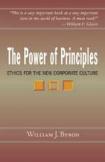Just Good Business
Nearly a quarter-century ago, when I first taught Business and Public Issues in a large state university, an undergraduate accounting student came to see me. The class had just discussed a case that described a difficult ethical dilemma. Not surprisingly, there was no easy answer for the case problem. But this student, accustomed to a solution manual in her accounting courses, assumed that there must be such a booklet for this course as well.
Imagine how much better the workplace might be with a solution manual for ethical dilemmas. No more gray areas, no more judgment calls, just a handy checklist that managers and others could use whenever such problems arise.
Of course, even the availability of a solution manual would not necessarily guarantee ethical behavior, as illustrated by the dozens of unopened Enron corporate ethics booklets that were reported to be big sellers on eBay. Indeed, Enron’s collapse is a stark reminder that companies and executives may come and go, but the need for ethical principles is timeless.
If executives and other organizational leaders are looking for a study guide rather than a solution manual, then William Byron’s The Power of Principles might be a good place to start. Father Byron is an ex-Army paratrooper who earned a doctorate in economics and held presidencies at the University of Scranton, The Catholic University of America and (on an interim basis) Loyola University in New Orleans. He currently serves as president of St. Joseph’s Preparatory School in Philadelphia.
Father Byron focuses on principles because he wants to provide direction and prompt behavior in business decision makers to enable them to steer clear of the ethical quicksand that sank Enron, Arthur Andersen and others. He organizes the book around 10 classic principles: integrity, veracity, fairness (justice), human dignity, participation, commitment, social responsibility, the common good, delegation (subsidiarity) and love.
Presented in the context of a new corporate culture, Father Byron contends that these 10 principles can help good people who, in the words of former Securities and Exchange Commission chair Arthur Levitt, are stuck in a bad system find a better way to conduct business. Indeed, boards that formerly were reluctant to criticize the C.E.O. (something billionaire investor Warren Buffett humorously likened to belching at the dinner table) are now expectedas the governance expert Nell Minow has long arguedto exercise their duty of curiosity along with their traditional legal duties.
Each ethical principle is illustrated with practical and memorable commentary and stories. The reader can consider, for example, Veracity (Incompetence is a form of lying), Human Dignity (He who talks to the janitor understands the organization) and Social Responsibility (the famous Tylenol tampering case and the straightforward way in which the C.E.O. addressed the public).
The indispensable closing chapter is a benevolent business ethics version of The Screwtape Letters. Whereas C. S. Lewis imagined a veteran devil passing on diabolical wisdom to a novice, Father Byron offers exemplary recommendations given by experienced elders in response to my invitation for them to offer advice to a son or daughter, grandson or granddaughter, or to any newcomer who is open to some mentoring in the early stages of a business career. Senior or retired executives from a computer company, an international consulting firm, a health care organization, a university, a transportation company, an investment corporation and a real estate brokerage, among others, offer serious and occasionally humorous words of wisdom. Their advice also summarizes the book’s key points and urges young people to seek out mentors who can help them navigate around the inevitable ethical potholes that will dot their chosen career roadways.
Finally, in the interest of full disclosure, readers of this review should be aware of some baggage I brought to this assignment, although enough time has passed that I now believe it is checked rather than carry-on baggage. In the preface, Father Byron cites Enron as the context for the reflection and conversation that this book is intended to stimulate. I had direct experience with Enron. During most of the 1990’s, I was senior vice president at the United Way of the Texas Gulf Coast (Houston). The convicted (and now deceased) chairman Kenneth Lay chaired the 75th-anniversary campaign. At the end of that decade, I was managing director of program services at the Greater Houston Community Foundation, and the now (as of this writing) convicted and imprisoned C.E.O. Jeffrey Skilling was on that board.
By the time Enron imploded, I had relocated some 2,000 miles away to Seattle, but the sting of deception and betrayal was no less painful. Friends and former neighbors lost jobs and pensions, nonprofits lost financial support (e.g., $5 million of the Houston United Way’s $75 million came from Enron), and even the Houston Astros baseball club had to rename its new stadium from Enron Field to Minute Maid Park.
Mark Twain once observed that Virtue has never been as respectable as money. This book may help to change that notion. Conversational in its approach, mercifully free of academic jargon and laced with many current examples, The Power of Principles would make an ideal resource for executive education seminars, for corporate training workshops or simply for the busy manager who is looking for a well-organized, thoughtful and easy-to-follow guidebook to the often gray area of workplace ethics.
This article also appeared in print, under the headline “Just Good Business,” in the April 16, 2007, issue.








